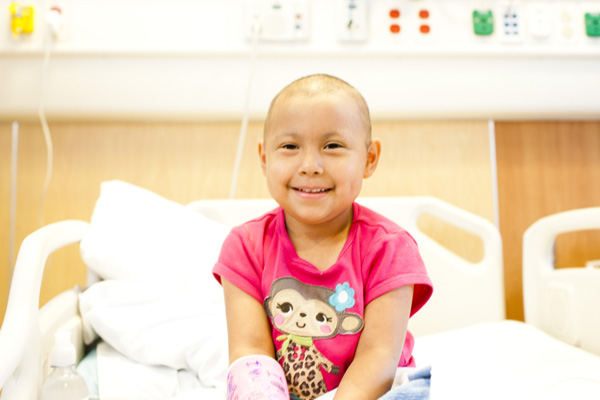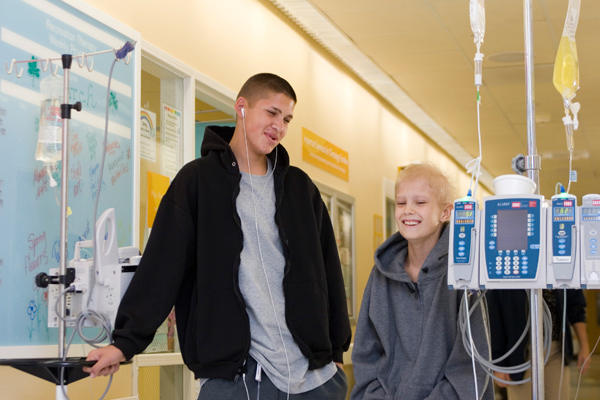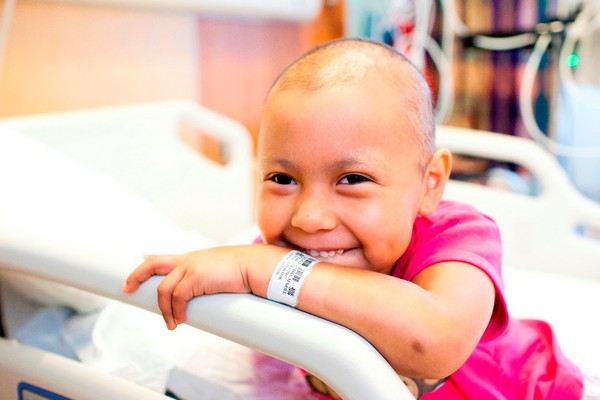Side Effects of Chemotherapy and Radiation in Children
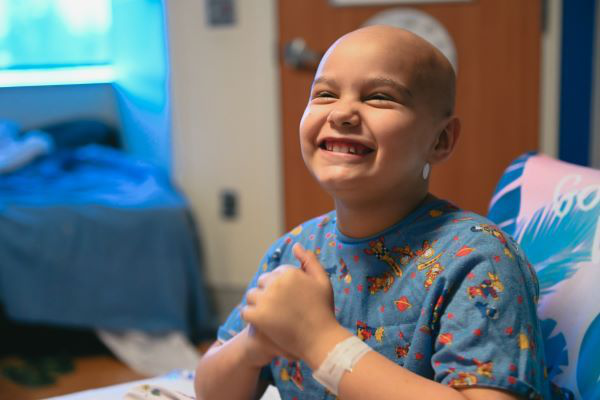 Cancer occurs when the body’s control mechanism stops working and instead of old cells dying, they continue to grow. Cancer cells divide and multiply much faster than normal cells. Uncontrolled cell growth can lead to masses of cancer cells called tumors or can stop healthy cells from working efficiently.
Cancer occurs when the body’s control mechanism stops working and instead of old cells dying, they continue to grow. Cancer cells divide and multiply much faster than normal cells. Uncontrolled cell growth can lead to masses of cancer cells called tumors or can stop healthy cells from working efficiently.
Chemotherapy, or “chemo,” and radiation are the most common types of treatment for cancer. They work by destroying the fast-growing cancer cells in the body, but they can also damage fast-growing healthy cells like blood and hair cells. When healthy cells are damaged, this can cause various side effects. Some side effects will show up right away, while others may develop over time. Every person reacts differently, so a child receiving chemotherapy or radiation will be monitored closely during treatment. Some children only have a few side effects, while other children may have many. It is important to know what side effects your child may experience so doctors and nurses can help to manage them.
Difference between chemotherapy and radiation
While chemotherapy and radiation are both treatments used to treat cancer, they differ in the way they work. Some types of cancer need only one of these types of treatment, while other types of cancer may need both.
Chemo targets and kill fast-growing cells. These medicines are not specific to one part of the body and work to prevent cancer cells from spreading throughout the body. Since chemo targets cells all over the body, it can cause side effects outside of where the cancer is located. Radiation is designed to target the specific area where cancerous cells are located, hoping to reduce any negative effects on healthy cells. Radiation damages the DNA of the cancer cells, causing them to die. While healthy cells can be affected, they will usually repair any damage and heal after treatment. Radiation therapy can lead to side effects in the area being treated.
Common side effects of chemo and radiation
No cancer or body are the same. Different types of cancer need different types of treatments. Some kids need both chemo and radiation, some need only one of them, and some may need other types of treatment. Your doctor will come up with a treatment plan based on your child’s age, type of cancer, and where it is located. Treatment is adjusted for every child, which affects the side effects that can occur. Some side effects can be more serious, while some are less severe. Some kids have only a few side effects, while others have many over the course of treatment. Many side effects improve over time, but some can be long-term. Your child’s doctor may modify his or her treatment to help reduce any side effects.
Side effects of chemo and radiation are dependent on the dosage and the child’s health. Chemo’s side effects also depend on the medicine used, while side effects of radiation depend on the location where it is given. Your child’s doctor will talk with you about the treatment needed for your child and common side effects that you may see.
See below to learn about some side effects a child may experience with chemotherapy or radiation and how to manage them:
Fatigue
Fatigue is the most common side effect of chemo and radiation. During treatment, and possibly for a short time after it is over, kids are likely to feel tired and “foggy-headed”. This feeling is normal and occurs with all types of treatment. This may worsen when a child’s red blood cells are low, or the child is anemic, which may require a blood transfusion. Encourage your child to rest when needed and take it easy with activities. Your child’s energy should return to normal after treatment is over.
Flu-like symptoms
Some medications can affect the body’s inflammatory response, causing flu- or cold-like symptoms. Some symptoms include a runny nose, chills, and a cough. Staying hydrated can help clear the mucus. It is important to call your doctor if your child experiences any fever or chills. Be sure to check with your doctor before using any over-the-counter medicines.
Nausea and vomiting
Most kids who receive chemotherapy or radiation will experience some nausea, vomiting, or loss of appetite. Symptoms related to radiation tend not to be as severe as those brought on by chemotherapy, except in children who receive radiation to the pelvis or abdomen.
It is also common that children’s taste preferences change during treatment. If your child’s appetite decreases, they can try eating multiple smaller servings each day instead of 3 larger meals. If your child does not feel like eating, it is important to keep your child hydrated with water, juices, and broths.
There are many different medicines that can help improve these symptoms. If one medicine does not work for your child, it is important to tell your doctor as there may be a different option. If your child is not able to drink liquids or has decreased amounts of urine, your doctor may consider admitting your child for IV hydration.
Weight changes
Some kids can experience weight loss or weight gain from chemotherapy or radiation. Children may require steroids as part of their treatment. Steroids can cause an increased appetite and weight gain in places like the cheeks or back of the neck. This typically goes away once the steroids are stopped. On the other side, kids can have decreased appetites or trouble keeping food down with chemotherapy. The chemotherapy may change your child’s taste so that they no longer enjoy foods they liked before.
If you are concerned with your child’s weight, reach out to your doctor to talk about ways to maintain a healthy weight based on your child’s medical needs.
Hair loss
While in chemo treatment, hair loss and thinning might occur. Radiation to the head and neck can also cause hair loss in that area, but radiation elsewhere will not cause your child’s hair to fall out.
For some kids, hair loss can be a traumatic event. Reassure them that their hair will grow back. Kids can wear baseball hats, scarves, or wigs to help feel more comfortable. Prior to treatment, some children receive a haircut, as it can be less scary to see shorter hair fall out rather than long strands. Some may even choose to shave their head. Whatever you do, make sure your child does what will make him or her feel the most comfortable during this time.
Anemia
As chemotherapy targets fast-growing cells, healthy blood cells can be destroyed during treatment. This includes red blood cells (RBCs), the cells that carry oxygen to different parts of your body. When red blood cells (RBC) are low, this is called anemia. If your child is anemic, this can cause fatigue, paleness, shortness of breath, and a fast heartbeat.
Your child’s blood will be drawn throughout treatment to monitor the levels of red blood cells. If RBCs are significantly low, a blood transfusion may be given.
Bleeding
Platelets are cells that help the blood to clot and can be affected during treatment. When platelets are low, this is called thrombocytopenia, which can lead to bleeding. You may see small red spots on the skin, bloody or black bowel movements or vomit, nosebleeds, bleeding from the gums, or bleeding from the line site (where fluids and medicines are given to kids).
Avoiding rough play and contact sports can help reduce the risk of bleeding. If your child experiences bleeding from the gums, you should brush with a soft toothbrush and be gentle with flossing. In some cases, your child may require a platelet transfusion.
Increased Risk of Infection
White blood cells (WBCs) can be lowered as a result of treatment. WBCs called neutrophils help fight infections. When neutrophils are low, this is called neutropenia and results in an increased risk of serious infection. Kids with cancer, especially those with neutropenia, have compromised immune systems and are not able to fight off bacteria and germs. A seasonal cold or virus that may not cause many symptoms in a healthy person can result in severe illness in a child receiving chemotherapy. Any fever can be a sign of serious infection and should be brought to the doctor’s attention immediately.
Some other signs of infection include:
- Chills
- Coughing
- Congestion
- Vomiting
- Diarrhea
- Pain in the ears, throat, stomach, head or when going to the bathroom
- Infection around the line site like redness, swelling, pain or oozing
Kids with neutropenia need to take extra precautions against germs. Like all kids, they should wash their hands before eating, after using the bathroom, and after petting animals. They also need to avoid crowded indoor places and visiting with friends/family who have contagious illnesses like a cold or flu.
Kids with neutropenia can catch viruses from people who have recently received live-virus vaccines, like measles or oral polio, so they should avoid contact with these people. Kids with neutropenia should not eat raw seafood or undercooked meat or eggs to prevent food-borne infections.
Physical pain
Headaches, muscle and stomach pains, or even temporary nerve damage can occur. This can result in burning, numbness, or tingling in the hands and feet. Always check with your doctor prior to taking any over-the-counter medicine since it could interact with the chemo drugs. If your symptoms are not improved with over-the-counter medicines, your doctor may prescribe a medicine to help.
Common Treatments which may cause this side effect: Vincristine, Vinblastine
Mouth, gum and throat sores
Mouth sores, sensitive gums, irritated throat and risk of tooth decay can occur with chemo and radiation. This occurs especially when radiation is targeted to the head and neck. Your doctor can prescribe a mouth rinse to reduce any irritation. To help your child minimize these symptoms, avoid high-acid foods and juices to limit irritability. Soft and cool foods can be easier to eat. Make sure to regularly brush your child’s teeth at home. Call your doctor if your child is unable to drink any liquids at home or prior to any dental work.
Common Treatments which may cause this side effect: Methotrexate, Radiation to the head and neck
Hearing loss
Some chemotherapy medicines can affect your child’s hearing. This most commonly affects high-pitched sounds. If your child receives one of these medicines, his or her hearing will be monitored with regular hearing screens.
Common Treatments which may cause this side effect: Cisplatin, Carboplatin
Constipation
Some chemotherapy medications can cause constipation. For this reason, it is important to make sure that your child is using the bathroom regularly. Encourage your child to drink liquids and walk around when possible to help with these symptoms. There are also medicines that your doctor can prescribe to help with constipation.
Common Treatments which may cause this side effect: Vincristine, Vinblastine, Pain medications
Diarrhea
Some chemo medicines may cause watery stools or diarrhea. This can also happen when your child has received antibiotics. It is important to encourage your child to drink fluids to prevent dehydration. Call your doctor if your child is unable to drink any liquids at home or if diarrhea becomes watery.
Common Treatments which may cause this side effect: Busulfan, Irinotecan
Skin irritation
Chemo can cause changes to the skin, such as rashes, redness, and skin irritation. If your child has had radiation prior to chemo, they are more prone to skin irritation with certain types of chemotherapy. Radiation alone can cause blisters, peeling, and swelling in the area of treatment. Ask your doctor if there are any recommended ointments or creams.
You may also see some increased skin pigmentation or nail changes. This should go away when chemotherapy is over.
To help with the discomfort wear loose and soft clothing. The affected area can be sensitive to the sun, make sure to wear sunscreen with an SPF of at least 30.
Common Treatments that may cause this side effect: Radiation, Cytarabine (Ara-C), Thiotepa, Sorafenib
Heart problems
Some medications can cause damage to the heart. This is rare and depends on the dose of medicine a child receives. Your child’s doctor will try to limit the dose to a safe amount and often give chemotherapy with another medicine to prevent any damage. Your child’s heart may be monitored regularly with ECHOs (an ultrasound of the heart) during and after treatment.
Common Treatments that may cause this side effect: Doxorubicin, Daunorubicin
Lung problems
Some treatments can cause damage or scarring to the lungs. This can cause your child to cough or have problems breathing. Your child’s lungs may be monitored during treatment with pulmonary function tests (PFTs) or x-rays.
Common Treatments that may cause this side effect: Bleomycin, Radiation
Kidney and bladder problems
Some chemo drugs are hard on the kidneys and bladder. Doctors will monitor your child’s kidney function by having frequent blood tests and checking your child’s urine. To prevent these side effects, chemotherapy is often given with lots of fluids. Encourage your child to stay hydrated, and make sure to tell your doctor if your child has bloody urine or any problems urinating.
Common Treatments that may cause this side effect: Cyclophosphamide, Cisplatin, Carboplatin
Blood clots
Some chemotherapy medications may increase a child’s risk of forming a blood clot. This can increase the risk for stroke. Encourage your child to drink fluids and walk around when possible to decrease his or her risk. It is important to call your doctor if your child is not behaving normally or has pain and swelling in an arm or leg.
Common Treatments that may cause this side effect: PEG-Asparaginase
Duration of side effects of chemo and radiation
The duration of side effects depends on a child’s overall health as well as the type of and amounts of drugs/radiation they receive. Most side effects go away gradually once treatment has finished and the healthy cells have had the chance to grow again.
While some side effects are temporary, cancer treatment can cause permanent changes to a growing body. Long-term side effects (late effects) can include damage to the heart, lungs, brain, nerves, kidneys, thyroid gland, or reproductive organs. Kids can also experience issues like delayed cognitive development, growth problems, or infertility. Some chemotherapy medicines can increase the risk of developing a second type on cancer later in life.
Before treatment, the doctor will discuss your child’s risk of late effects and what precautions can be taken before or during treatment to prevent or decrease these effects.
How to explain chemotherapy/radiation to your child
It can be difficult helping your child cope with the sometimes painful and uncomfortable side effects of treatment. Your child could be feeling angry, sad, and/or scared. Your child’s emotional health is an important part of his or her treatment. There are many resources available to help support your child and your family through this difficult time. Here are some ways you can help handle your child’s emotions and questions.
- Explain the process and what is going on in an age-appropriate way.
- Answer their questions honestly.
- Ask for support from their nurse, oncologist, or expert working with the family.
Patient stories, a hospital support group, a child life specialist or a psychologist from your child’s care team could be great resources to provide advice and comfort in this difficult time.
Hyundai Cancer Institute at CHOC
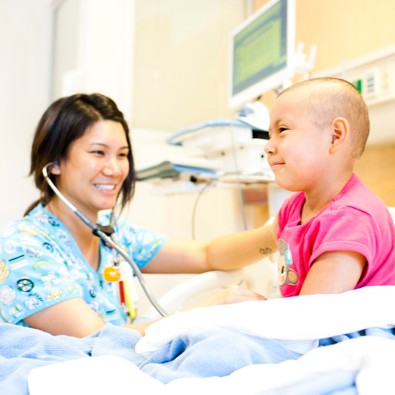
We know that managing your child’s condition can be overwhelming, and we want to relieve and assure you your child is receiving the best care. While we do not offer radiation treatments at our facilities, we work with our next-door partner, St. Joseph Hospital radiation oncology to provide this service.
Learn more about the support services, treatments and programs offered at Hyundai Cancer Institute at CHOC.
Knowledge is the best medicine. Learn more about your child's health in these features from the experts at CHOC.
Precision Medicine
Precision medicine is personalized medicine using genetics and a patient’s health information to design a targeted treatment for a person’s specific disease.
Teens and Cancer
Our adolescent and young adult cancer treatment program and comprehensive approach considers not only the physical, but also the psychological components.
Kids and Cancer
Children with cancer are not just considered “little adults” in terms of care. “We want them to still be children,” says Dr. Frediani.
